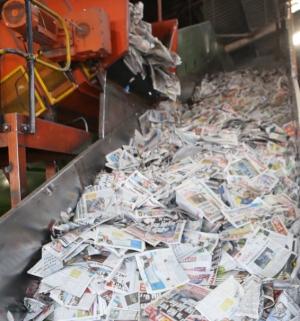
South African Paper Recycling Industry Sees Upswing in Demand for Paper FibreIndustry appeals to country to separate paper products for recycling  The COVID-19 pandemic, lockdown and slowed economy have resulted in reduced availability of used white paper, newspapers and cardboard boxes.
The COVID-19 pandemic, lockdown and slowed economy have resulted in reduced availability of used white paper, newspapers and cardboard boxes.
Johannesburg, September 9, 2020 (Press Release) - South Africa's paper recovery rate is at 68.5% with 1.2 million tonnes of recyclable paper products diverted from landfill during 2019, according to Anele Sololo, general manager of RecyclePaperZA, the paper recycling association of South Africa. "Although the paper recovery rate was slightly down on 2018, the same tonnage was diverted from landfill at 1.2 million tonnes," explains Sololo, pointing out that there is often a lag between consumer or industrial use, and the recycling or manufacturing into new product. The percentage drop could also be attributed to companies holding stock of paper products and recovered paper for recycling or waste traders awaiting better export opportunities, she says. During 2019, there was also an increase in export sales of packaged agricultural and non-agricultural products, which meant that less packaging — around 280 000 tonnes — was available for domestic recovery and recycling. RecyclePaperZA is encouraged to see more brands looking at paper-based packaging solutions as paper offers something that no other packaging material does — it stores carbon. Absorbed by trees during photosynthesis, the carbon remains locked up in wood and paper products for their lifecycle. "Paper recycling helps to keep the carbon locked up for longer and out of the atmosphere," says Sololo, adding that paper is only sourced from sustainably managed timber plantations. "This makes paper a renewable resource too." Effects of lockdown on the recycling economyThe COVID-19 pandemic, lockdown and slowed economy have resulted in reduced availability of used white paper, newspapers and cardboard boxes. "Contrary to late last year, when the market was in a cycle of oversupply, we are now experiencing reduced supply and increased demand for paper fibre," says Sololo, adding that with offices and schools closed, there is less used office paper available for recycling. White paper is a recycling staple, especially in the production of tissue products. With fewer physical newspapers in circulation during lockdown, there was less of this grade available for use in moulded fibre products such as egg boxes and takeaway cup holders. "Sadly, we have also seen a number of magazine titles closing down." As the economy opens up, RecyclePaperZA members are hoping that the supply-demand ratio will even out, in particular in the e-commerce market. "Remember to recycle those online shopping boxes!" say Sololo. Collective effort requiredThe 1.2 million tonnes of paper and paper packaging collected in 2019 would, when baled:
"More importantly, this recovered paper saved 3.6 million cubic metres of landfill space in 2019, provided an income for countless informal collectors and kept the local paper, packaging and tissue industry productive," notes Sololo. Among the most recycled paper-based items in 2019 were cardboard boxes at 71% while office paper recovery and beverage cartons sit at 16% and 10% respectively. "We continue to work with our members, along with Fibre Circle, the producer responsibility organisation for our sector, to emphasise how important recycling is, and why brand owners and retailers must design paper products for easy recycling." Successful recycling goes far beyond putting something into a separate bin. It requires a collective effort — from producers and retailers who sell packaged products, to consumers who use them, along with the recycling industry — from collectors to recycling mills. "Every company and individual in South Africa can play a part in ensuring that used paper, boxes, milk and juice cartons and paper cups get to the recycling mill and are made into new products we use every day," says Sololo. The recycling economy not only provides an environmental service, it preserves jobs and livelihoods and provides packaging and tissue manufacturers with raw material. Sololo notes that one job is sustained for every 40 tonnes of paper recycled. A little effort makes a big differenceWith National Recycling Day on Friday, September 18, now is as good a time as any for businesses to start recycling. Here are some helpful tips:
There are number of collection or drop-off options available depending on where you live or operate your business. You could support a local recycling collector or business, check if your area is serviced by a collection programme, support a school or community centre's recycling initiative or contact a RecyclePaperZA member. To learn more about the Paper Recycling Association of South Africa, visit: www.recyclepaper.co.za The Paper Manufacturers Association of South Africa (PAMSA) promotes the renewability and recyclability of paper products that we use every day. PAMSA represents 90% of South African pulp and paper manufacturers and also manages RecyclePaperZA, the paper recycling association of South Africa, which represents processors of recycled paper fibre. PAMSA provides a platform to the sector on pre-competitive issues such as research, energy, water and environmental matters as well as education, training and development. To learn more, visit: www.thepaperstory.co.za. SOURCE: Paper Manufacturers Association of South Africa |